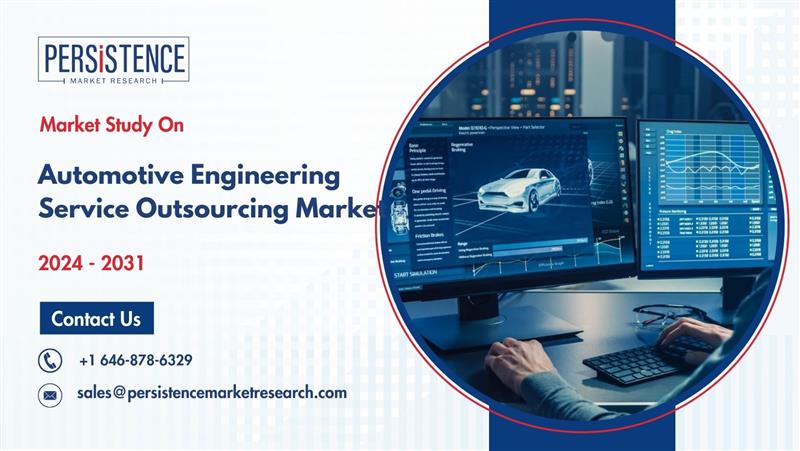Automotive Engineering Service Outsourcing Market Set for Strong Growth Over Next Decade

Strong 8k brings an ultra-HD IPTV experience to your living room and your pocket.
The global automotive engineering service outsourcing (ESO) market is projected to reach USD 108.58 billion in 2024, growing at a CAGR of 10.7% to USD 221 billion by 2031. Demand for ESO is driven by advanced connectivity technologies, the adoption of IoT and AI, and government incentives for electric and hybrid vehicles. Notable companies like Tata Technologies and Capgemini are partnering with OEMs to develop AI-driven ADAS systems and other digital solutions. The market is seeing a shift towards electric, autonomous, and connected vehicles, with designing services leading at 35% of market share. North America and Asia Pacific are key regions, with the latter benefiting from low-cost labor and a skilled workforce. The rise of software-defined vehicles is also increasing demand for expertise in AI, IoT, and big data analytics.
The automotive engineering service outsourcing (ESO) market is poised for substantial growth over the next decade, driven by technological advancements, increasing consumer demand for sustainable and innovative vehicles, and the industry's evolving landscape. With a projected market value of billions, outsourcing services in the automotive sector are becoming an essential strategy for companies aiming to stay competitive in a rapidly transforming industry. This article explores the driving forces behind this growth, key trends shaping the market, and what the future holds for automotive engineering service outsourcing.
Key Drivers of Growth in the Automotive ESO Market
- Technological Advancements and Electrification of Vehicles
As automakers focus on meeting sustainability goals and government regulations regarding emissions, the demand for electric vehicles (EVs) has surged. Electric and hybrid vehicle development requires specialized engineering services, including the design of electric drivetrains, battery management systems, and lightweight materials, among others. These are areas where outsourcing firms excel, providing automakers with the expertise necessary to accelerate EV production and innovation.
Furthermore, the rise of autonomous vehicles (AVs) is pushing automakers to integrate complex technologies such as artificial intelligence (AI), sensor technologies, and vehicle-to-everything (V2X) communication systems. As these advancements require highly specialized knowledge, automotive companies are increasingly turning to outsourcing partners to support the development of self-driving technologies.
- Cost-Reduction and Operational Efficiency
One of the primary reasons automakers are turning to outsourcing is the desire to reduce operational costs. Developing in-house engineering capabilities can be costly, particularly when it comes to specialized areas such as advanced materials, electronics, and software integration. By outsourcing certain functions, automotive manufacturers can focus on their core strengths, such as branding and marketing, while leveraging external expertise to optimize product development and reduce overall costs.
Outsourcing allows companies to access global talent pools at competitive pricing, which is crucial for managing the complexities and competitive pressures of the modern automotive landscape. Moreover, outsourcing enables automakers to scale their operations more efficiently, reacting to market fluctuations and technological changes with greater agility.
- Regulatory Compliance and Safety Standards
With governments around the world introducing stricter regulations surrounding safety, emissions, and environmental concerns, automotive companies must ensure their vehicles comply with local and international standards. This has led to increased demand for outsourcing providers that offer testing, compliance, and certification services.
To meet regulatory requirements, automakers are outsourcing engineering services related to crashworthiness, emissions testing, and the integration of advanced safety systems such as adaptive cruise control, lane-keeping assistance, and emergency braking. Outsourcing partners help ensure that automakers meet these requirements while maintaining high standards of vehicle quality and safety.
Trends Shaping the Automotive Engineering Service Outsourcing Market
- Focus on Sustainability and Green Engineering
Sustainability is a top priority in the automotive industry, with a growing emphasis on reducing environmental impact. As automakers seek to improve fuel efficiency, reduce emissions, and incorporate eco-friendly materials into vehicle designs, the role of outsourcing firms has become even more critical.
Outsourcing providers are at the forefront of these efforts, assisting in the development of lightweight materials, electric vehicle architectures, and more energy-efficient drivetrains. As part of their sustainability strategies, outsourcing firms are also helping automakers optimize their manufacturing processes to minimize waste and energy consumption.
- Rise of Smart Manufacturing and Digital Transformation
The automotive industry is undergoing a digital transformation, with manufacturers increasingly adopting smart manufacturing technologies. These include robotics, automation, and big data analytics to optimize production processes, reduce costs, and improve quality.
As part of this transformation, outsourcing providers are offering services that help automakers integrate Industry 4.0 technologies into their operations. By leveraging digital tools such as predictive analytics, machine learning, and the Internet of Things (IoT), outsourcing firms can support automakers in streamlining their supply chains, improving operational efficiency, and reducing downtime in production.
- Adoption of Agile Outsourcing Models
As the automotive industry faces increasing pressure to accelerate innovation cycles and respond to changing consumer demands, agile outsourcing models are gaining popularity. Unlike traditional outsourcing, which involves long-term contracts and fixed terms, agile outsourcing emphasizes flexibility and the ability to quickly scale services up or down as needed.
This shift toward agile methodologies allows automakers to speed up the development of new vehicle models, implement rapid prototyping, and deliver products faster to the market. Agile outsourcing also enables companies to react to unforeseen challenges or new opportunities with greater flexibility and speed.
- Expanding Market for Outsourcing in Emerging Economies
While North America and Europe have traditionally been the primary outsourcing hubs for automotive engineering services, there is an increasing shift toward emerging markets, particularly in Asia-Pacific, Latin America, and Africa. These regions are experiencing rapid growth in automotive production and are becoming key centers for engineering services.
Asia-Pacific: Countries like China, India, and Japan are not only emerging as major automotive manufacturing hubs but also as strong players in the outsourcing landscape. With a large, skilled workforce and relatively low operational costs, the region is attracting global outsourcing providers looking to tap into growing automotive markets.
Latin America and Africa: As automotive production continues to grow in regions such as Mexico and Brazil, the demand for outsourcing services is also on the rise. Additionally, in Africa, markets like South Africa are becoming important players in the global automotive industry, with outsourcing providers expanding their reach to meet the needs of local manufacturers.
Strategic Impacts of Outsourcing on the Automotive Industry
- Increased Innovation and Faster Time-to-Market
By outsourcing specialized engineering services, automotive companies can innovate faster and more effectively. Outsourcing allows automakers to access the latest technologies, industry expertise, and research and development capabilities without having to invest heavily in in-house resources.
For example, automotive companies that outsource their software development can integrate cutting-edge technologies such as autonomous driving software or real-time vehicle diagnostics without the time and expense of developing these capabilities internally. This allows automakers to accelerate time-to-market for new models and enhance their competitive edge.
- Enhanced Flexibility and Scalability
The ability to scale operations quickly in response to market demands or unforeseen challenges is a significant advantage of outsourcing. Automotive companies can rely on outsourcing partners to provide the necessary resources and expertise when needed, without the risk of overburdening in-house teams or overspending on infrastructure.
This flexibility allows companies to better handle fluctuations in demand, rapidly respond to changes in consumer preferences, and pivot quickly when new opportunities arise.
Conclusion: A Bright Future for Automotive Engineering Service Outsourcing
The automotive engineering service outsourcing market is set for strong growth in the coming decade, fueled by technological advancements, cost pressures, regulatory requirements, and the need for specialized expertise in areas such as electric and autonomous vehicles. As the automotive industry continues to evolve, outsourcing will play a critical role in enabling manufacturers to innovate faster, reduce costs, and meet the ever-changing demands of the global marketplace.
As outsourcing partners continue to offer flexible, agile, and specialized solutions, automakers will be better equipped to face the challenges of the modern automotive landscape while maintaining a competitive edge in a rapidly evolving industry. The future of automotive engineering service outsourcing looks bright, with abundant opportunities for both outsourcing providers and automotive manufacturers alike.
Note: IndiBlogHub features both user-submitted and editorial content. We do not verify third-party contributions. Read our Disclaimer and Privacy Policyfor details.







